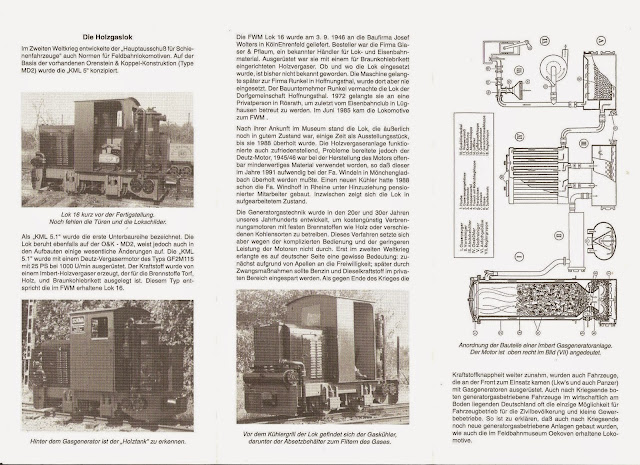While going through a box with an assortment of brochures picked up from visits to narrow gauge railway museums, I found this from Feldbahnmuseum Oekoven on their preserved KML 5 with gas generator. Basically the little flyer tells all you the basic facts about the loco - in case you read German, that is!
My own model of a KML 5 in 1:35 scale is a good representation of the prototype and I would recommend anyone to try the 3D printed model - it is an interesting prototype and well designed. All I added was a Bullant motor bogie, some small details and paint.

Tuesday, 30 June 2015
Sunday, 21 June 2015
Placing Buildings (1/35)
After having worked out the basic design and general placement of the buildings, walls and fences on module 4, I had to figure out how close to the track I could place them. As Nystrup Gravel is a very normal industrial railway, there is no such thing as an authorized construction profile that regulate minimum distance from track to buildings or other objects. I do however want all my locos and rolling stock to be able to pass safely through the industrial district, so I did some testing during this week. The results (and some figuring out what equipment Nystrup Gravel might acquire in the future) showed that a minimum distance of 4 cm. from track centre was sufficient. Allowing for 1 cm. of extra clearance on each side of the track I decided not to place any object closer to the track centre than 5 cm. I also considered that there has to be room for my hand when cleaning rails.
 |
| Nystrup Gravel's speeder is tested for fit between buildings on module 4. The building of Bankes Bakelit needs to be heightened a bit. Good thing to have a card board mock up to work on. |
 |
| Two strips of plywood acts as a guide for the brick wall. I will add a wooden fence where the masking tape is placed. |
 |
| Part of my rail profile collection in action, holding down the plywood strips while the glue sets. |
Monday, 15 June 2015
Summer puts a hold on modelling
Summer (combined with a lorry model that is fighting every effort I make at constructing a barely acceptable model) has put a short halt to my modelling activities. Lots of garden and house chores is being performed, though. I have been lucky enough to spend a few days on railway work in 1:1 scale. I have taken part in the running of passenger trains and the usual manual labour to keep the track in good order. Fortunately I really enjoy working with real narrow gauge railways and I pick up a lot of inspiration every time I volunteer on HVB. Just check out the film below - who wouldn't want to recreate such a nice train in model?
Modelling will be taken up again soon. No doubt the Danish weather will swiftly change and provide plenty of time for indoor activities. Plans for defeating the uncooperative lorry model have been drawn up and a supply of brick wall segments cast in plaster awaits being combined into a wall for my factory module. My summer vacation is also in sight and will as usual contain some modelling - more on that later.
Friday, 5 June 2015
Constitution Day and Shrubbery (1/35)
Today was Constitution Day in Denmark. Each year we celebrate how democracy was introduced in Denmark in 1849. This year we also celebrate the centennial of women's right to vote. The day is a day off at the university where I work and the nice summer weather took me out on the porch to do a little modelling.
In an effort to spice up my bridge module with a bit more undergrowth I took advantage of some commercially made bushes.They are from Polak Model from the Czech Republic. I thought the banks of the stream needed more growth. I test planted some of the bushes and will continue to plant more along the stream.
While I like to do a lot of things from scratch, it is great to be able to take advantage of well made bushes right out of the box. It surely adds speed to my landscaping efforts.
In an effort to spice up my bridge module with a bit more undergrowth I took advantage of some commercially made bushes.They are from Polak Model from the Czech Republic. I thought the banks of the stream needed more growth. I test planted some of the bushes and will continue to plant more along the stream.
 |
| My bushes are willow green and will add a touch of light to the banks of the stream. |
 |
| The bushes right out of the package. They are fitted to a thick piece of felt with static grass and a little flock. |
 |
| Planting bushes on the porch in Danish summer weather. A glass of French rosé adds to the pleasure. |
Subscribe to:
Posts (Atom)



